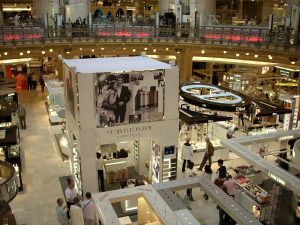 The coronavirus crisis has had an enormous impact on nearly all sectors, from the shutdown of non-essential businesses and supermarkets having to adjust their re-stocking strategies and opening hours, to the immense pressure placed on healthcare systems around the globe. So, it should come as no surprise that the effects of this pandemic have also ravaged the fashion industry from high-end jewellery and designer shoes to large shapewear and everyday lingerie, and everything in between.
The coronavirus crisis has had an enormous impact on nearly all sectors, from the shutdown of non-essential businesses and supermarkets having to adjust their re-stocking strategies and opening hours, to the immense pressure placed on healthcare systems around the globe. So, it should come as no surprise that the effects of this pandemic have also ravaged the fashion industry from high-end jewellery and designer shoes to large shapewear and everyday lingerie, and everything in between.
While the fashion industry has been brushed off as trivial, compared to essential services leading the fight against the virus and its effects, it is still one of the largest tax contributors in economies across the world and not to mention a creative mecca. The collapse of the fashion industry can have a significant impact on the global economy in addition to the loss of jobs for millions of designers, artists, seamstresses, and so on.
The virus has spread at varying rates, with each country being affected in its own way. The most recent lockdown measures in the UK still advocate working from home where possible, and for those who can’t have been advised to return to work (along with more relaxed rules concerning exercise and outdoor leisure time).
Even with the easing of some of the more stringent lockdown measures, and them even being lifted in some countries like France, the effects of the global health crisis are still being strongly felt, and the fashion industry is faced with a lot of uncertainties.
From premium fashion brands donating billion of pounds to the likelihood of a humanitarian crisis in Bangladesh, below are all the ways in which the fashion industry is coping under all this turmoil.
A Passionate Rebound of Fashion Shopping Seen in France
On Monday 11 May, people took to social media to share photos and videos of shoppers lining up outside fashion stores such as those of Louis Vuitton and Zara following the lifting of the French lockdown that had been in place for eight straight weeks.
According to reports from The Telegraph, in Paris, shoppers at BHV, a landmark department store, were asked to wear masks at the store and also use hand gels, while Zara put up a poster saying “Happy to see you again”.
A majority of the public was vexed by the images of shoppers rushing to the clothing rails and checkouts too soon after the reopening. But according to BBC, business is still not ‘as usual’ as various parts of the nation, including Paris, the capital, are still under stricter restrictions. The country has been divided into red and green zones.
The lifting of France’s lockdown might just offer a deeper perspective into how consumers are likely to react in the months to come.
Influencers Use Their Power to Fundraise
Even though most non-essential employees might feel hopeless in the midst of this crisis, influencers and fashion-oriented celebrities are making an effort to find ways to contribute.
For instance, Bettina Looney and Anna Rosa Vitiello (all stylists) organised a wardrobe clear out on their individual Instagram stories all in a bid to raise money for Help Them Help Us and Doctors Without Borders charities.
Looney told ELLE UK that they were looking to come up with fun and interactive ways of raising funds for charities in need of assistance during this pandemic.
She added that fashion is their passion, and it can be the best machine for giving back to society. They managed to find a way to bring the two together, and they had a rather impressive response. She continued by stating that they will continue to host a sale every week on Mondays for as long as possible to continue raising money and spreading awareness. She concluded by stating that they will also partner with smaller brands to facilitate this.
Fashion Brands Cancelling Orders in Bangladesh
Forbes reported that as a result of stores being closed down and sales downturns, western fashion brands had to cancel orders amounting to over $2.8 (£2.26) billion from Bangladeshi suppliers, which has potentially sparked a humanitarian crisis.
